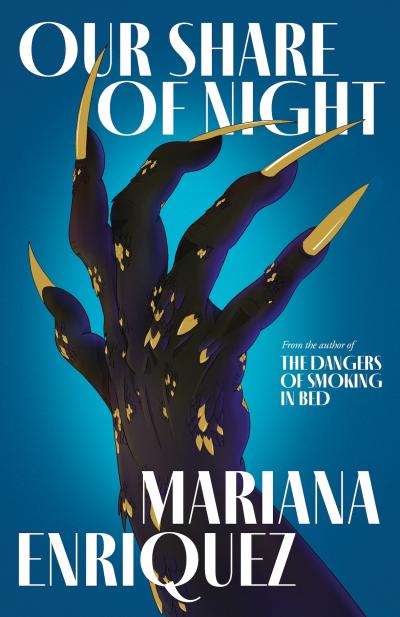Tense with horror and the sticky darkness of the Argentinian night, Mariana Enriquez’s writing is rich and occult. Her epic novel, Our Share of Night, vividly translated from the Spanish by Megan McDowell, follows on from her short story collections Things We Lost in the Fire and The Dangers of Smoking in Bed. In this, her first novel to be translated into English, she delves further into a lushly violent and erotic world.
Our Share of Night is set in the aftermath of the Argentine military junta’s worst excesses. The book begins in 1981 (the dictatorship ended in 1983) and the countryside that the protagonist, Juan, travels through with his son, Gaspar, is seeded with the bodies of the dictatorship’s victims, who are known as "the Disappeared".
Juan is a reluctant medium for a death cult called the Order (he turns into a violent monster-god during their ceremonies). He can see the ghosts of the Disappeared and is determined to shelter his son from them, as well as from the excesses of the cult. Juan’s wife’s family made him what he is, in service of their own grisly ends, and they are the reason that Juan and Gaspar are on the run. The behaviour of this family is an analogue for that of the junta, capturing children to maim and torture, and adults to feed to the darkness that emanates from Juan in their rituals.
 The central father-son relationship is complex and deeply flawed. Enriquez explores the transformative desperation of a man who wants to protect his child, which turns into the resentment of a father who hurts and eventually terrifies his son. Their story bookends the narrative of Gaspar’s mother, Rosario, an anthropologist who documents local customs and mythology, especially those of the Paraguayan Guaraní. Her perspective steers a large section of the book, as she travels to England, and the South American stories become interwoven with those from the European tradition. The reader sees that the evil haunting Rosario's family cannot be escaped: their wealth, violence and death-drive pervade every place and destroy every person who comes into their orbit.
The central father-son relationship is complex and deeply flawed. Enriquez explores the transformative desperation of a man who wants to protect his child, which turns into the resentment of a father who hurts and eventually terrifies his son. Their story bookends the narrative of Gaspar’s mother, Rosario, an anthropologist who documents local customs and mythology, especially those of the Paraguayan Guaraní. Her perspective steers a large section of the book, as she travels to England, and the South American stories become interwoven with those from the European tradition. The reader sees that the evil haunting Rosario's family cannot be escaped: their wealth, violence and death-drive pervade every place and destroy every person who comes into their orbit.
This is a deeply immersive and emotionally sensitive story, but – a word of warning – it is not for the faint-hearted. The violence in this book, particularly that inflicted upon children, is almost unreadable (the description of the creation of an Imbunche, a character of rural Chilean nightmare, is a notable example). That excess is no doubt intentional: it reveals the darkness of the human soul, the awful lengths we will go to in order to attain power, and serves as a stark reminder that, although these tortures are horrific, they have most likely been practised many times before. This may be a supernatural story, but the violence is very human.
Our Share of Night is an enthralling, eloquent novel that demonstrates the full extent of what wealth and corruption can do to us, showing how this plays out in a personal narrative alongside that of a ghostly, bloated regime. Enriquez shows how the Order sucks the voices and lives of her characters deep within it, leaving the reader with the feeling that these people are out there, somewhere, pulling another fly into their web.
- Our Share of Night by Mariana Enriquez, translated by Megan McDowell (Granta, £18.99)
- More book reviews on theartsdesk















Add comment